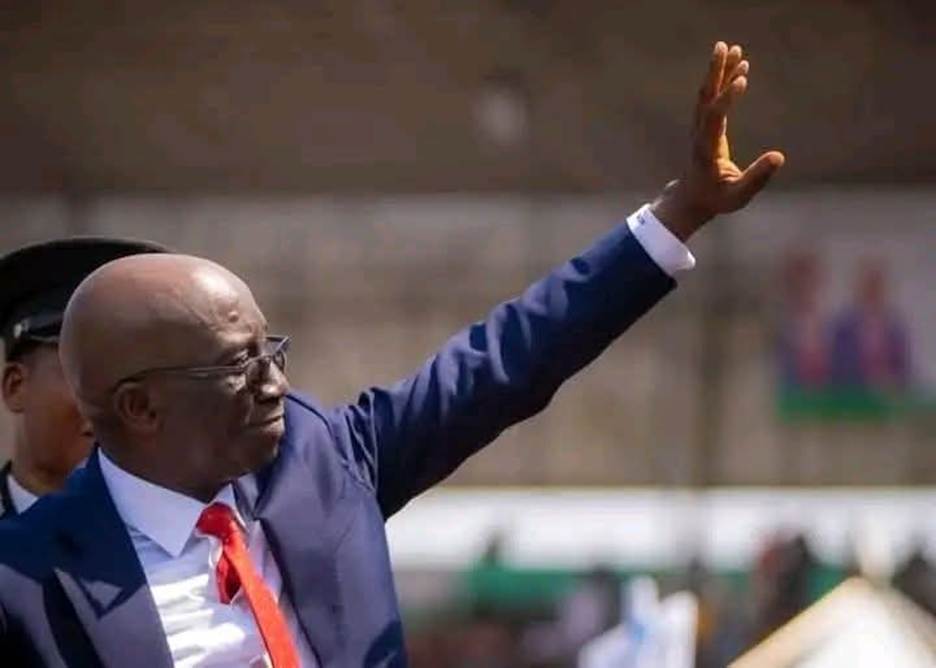
Gov Monday Okpebholo of Edo State
It had been jubilation galore on Wednesday in the camp of Governor Monday Okpebholo of Edo State and the ruling All Progressives Congress as their victory at the September 21, 2024, governorship poll was affirmed by the court.
The three-man Justice Wilfred Kpochi-led Edo State Governorship Election Petition Tribunal which sat in Abuja, had dismissed, for lacking in merit, the petition brought before it by the aggrieved candidate of the Peoples Democratic Party, PDP, Dr. Asue Ighodalo, challenging Okpebholo’s victory.
In a unanimous decision, the tribunal said it found no reason to nullify the outcome of the governorship poll because the petitioners failed to, by way of credible evidence, establish why the outcome of the election should be set-aside.
Their Lordships held that the onus of proving that Okpebholo was unduly returned by the Independence National Electoral Commission, INEC, rested squarely on the petitioners, adding, it was trite law that a petitioner must succeed on the strength of his own case and not on the weakness of the defence.
Newsmata.com.ng reports that INEC had declared Okpebholo of the APC duly elected with 291, 667 votes against the 247, 655 votes recorded by Ighodalo of the PDP.
Rejecting the result, Ighodalo and his party filed a petition at the tribunal, alleging that the election was not conducted in substantial compliance with provisions of the Electoral Act, 2022.
In the petition marked: EPT/ED/GOV/02/2024, they claimed that Okpebholo did not secure the highest number of lawful votes that were cast at the election.
The petitioners further alleged that INEC failed to serialise and pre-record some of the sensitive materials that were deployed for the poll, a situation they said aided the rigging of the election in favour of the APC and its candidate.
The PDP and its candidate specifically claimed that there was wrong computation of results in 765 polling units in the state. But contrary to their claim that they had over 900 witnesses lined up to corroborate their claims, they were able to produce only 19 witnesses that testified and tendered exhibits before the tribunal.
Among exhibits tendered were a total of 153 Bimodal Voter Accreditation System, BVAS, machines that were used in 133 polling units.
But in its judgement, the Tribunal ruled that the PDP’s petition failed due to lack of competent witnesses.
It also noted that contrary to section 16 (1) of the First Schedule to the Electoral Act, the petitioners, in their reply, introduced new facts that were not contained in their substantive case, and were therefore rejected and struck out
However, contrary to the position of the Respondents, the panel admitted as valid, documents the petitioners tendered in evidence from the Bar. It also noted that the petitioners were very detailed in chronicling the wards and polling units where the alleged infractions took place.
This not withstanding, the tribunal held that the PDP and its candidate merely dumped exhibits before it without demonstrating them through competent witnesses as required by the law.
The Tribunal said the PDP’s petition also failed, because of insufficient evidence to substantiate claims of electoral malpractice. The petitioners had alleged that the failure to properly record electoral materials prior to the election had affected the results.
However, the Tribunal found that while documents were submitted, no witnesses were called to properly authenticate them, rendering the evidence inadmissible.
Of the 19 witnesses presented by the petitioners, 14 were ward and local government agents, while their star witness, who claimed to be a director of strategy, played no direct role in the conduct of the election.
The Tribunal therefore concluded that none of these witnesses provided testimony on the alleged failure of prior recording of electoral materials, deeming them incompetent to testify on the matter.
On alleged over-voting, the Tribunal posited that for allegations of over-voting to be proven, petitioners must provide oral evidence in line with the precedent set by the Supreme Court. It insisted that it was bound to adhere strictly to the Supreme Court’s roadmap in adjudicating election disputes.
While observing that the witnesses called by the petitioners had no direct knowledge of events at the polling units, as they were not physically present during the election, the three-man panel held that the petitioners ought to have called witnesses with firsthand accounts to substantiate their claims.
In the light of these findings, the Tribunal returned the verdict that the petitioners failed to meet the required burden of proof, and it subsequently struck out their petitions causing wild jubilation in the ruling party and its sympathisers.